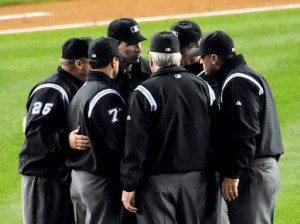
According to Major League Baseball commissioner Bud Selig, instant replay will expand in 2014. It’s expected to be formally approved by a 75 percent favorable vote of owners this fall, but will also require approval of the MLB Player’s Association and umpires, with both groups seemingly in favor of the change.
What approved changes should we expect next year? Managers will have three challenges per game; one for the first six innings of play and two more beginning in the seventh inning through a game’s conclusion.
Like in football, if a manager challenges a play and is successful, the team will not be charged with a review. In addition, if the manager uses up his three challenges, the umpire crew may decide to a review a play (like in the red-zone in football from the reviewing booth), but solely for home-run calls, a rule that will be implemented with the new regulations. All reviews will go to the central Major League Baseball Advanced Media, and officials with umpiring experience will review the play in question. As I understand it, disputed plays will not be reviewed by the crew chief.
While three challenges seems like a lot, initially, who knows exactly how this will play out. The replays seem to cover virtually every aspect of the game except balls and strikes. Personally, with today’s technology, it’s hard not to scrutinize every bang-bang play or game-changing call that may impact a series, potential playoff birth or personal accolades, such as a perfect game or no-hitter. Two recent examples come to mind: Johan Santana‘s no-hitter against the Padres last year, where a ball that looked seemingly fair — hitting the chalk down the left field line past the third base bag — yet was called foul, which resulted in the Mets first ever no-hitter. That no-no left the Padres as the only team in MLB to not have a no-hitter. The other obvious example was Jim Joyce’s botched call at first base which ended Armando Galarraga‘s would-be perfect game. The game is refereed to as the imperfect perfect game.
Over the years, there have been many calls that, if reviewed, could have changed the course of history. From the Steve Bartman incident in Chicago, which many believe may have cost the Cubs in 2003. At the same time, the lack of review catapulted the Florida Marlins to an eventual World Series title. Would a reversal changed the course of baseball history?
This could also be challenging for some of the league’s worst umpires, such as Angel Hernadez, who is infamous around the league for blown calls. I won’t go there, because I wouldn’t know where to start and finish — yes, it’s that bad. Hopefully, this will weed out some of the worst umpires, and the bravado that often challenges umpire-manager relationships, often after heart breaking losses as a result of a terrible blown call. That’s only human nature, right?
The human element of the game is sacred and priceless, and some believe instant replay will challenge the traditional aspects of the game — if you challenge every call, it may take away from the human element making the game more robotic, which could hinder the emotion and intensity of the game we love. Fans don’t want the regular or postseason games to become emotionless like the All-Star Game. Although, I don’t think that will happen by a long shot. Fans like the emotion of a manager jawing with an umpire on a blown call. Watching emotional managers like “Sweet Lou” Pinella kick his hat, throw bases or cover the plate with dirt revs up players and fans. It enhances the entertainment value for the fans, and that’s a good thing.
There are those in the industry who believe the new rules could create confusion, and managers, coaches and players alike would be challenging plays that are not challengeable, and in turn would make the game much longer. I mean, it sounds simple of the surface, but with managers making such trivial mistakes — like visiting the pitchers mound twice during a single inning — what kind of confusion will this cause?
Having said that, I am all for this. We have the technology to get calls right, and in today’s age, with myriad social media outlets and blogs, news gets out so rapidly and accurately. Showing HD close-up replay shots ad nauseam on the Jumbotron, that all fans can see see easily and quickly, draws more attention to what went wrong in game vs. what went right. So, why not have the right calls dictate the outcome of the game, not an umpire, regardless of how few miscalls there really are per year?
Two thumbs up for me, what are your thoughts?
